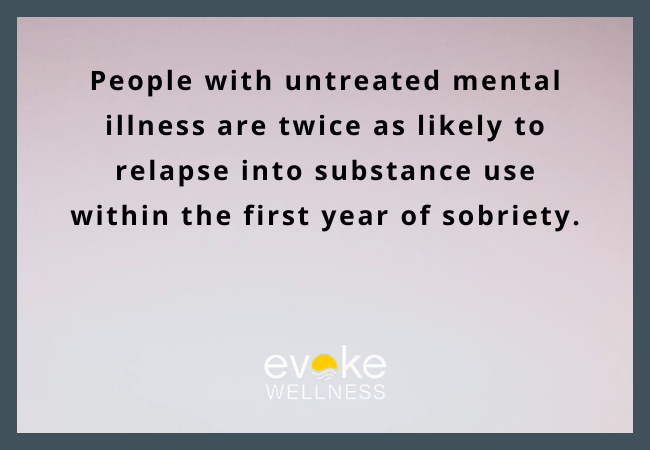Dual diagnosis refers to the co-occurrence of both mental health disorders and substance use disorders. Individuals who struggle with dual diagnosis often face a complex and challenging path to recovery, as both conditions must be treated simultaneously. For these individuals, residential rehab offers a highly effective and structured approach to treatment, providing the environment and resources needed for healing and long-term success.
At Evoke Wellness at Cohasset, we understand the complexities involved in treating dual diagnosis. Our Residential Treatment Program in Massachusetts is specifically designed to address the unique needs of individuals with both addiction and mental health conditions. Through a combination of evidence-based therapies, compassionate care, and personalized treatment plans, we help clients regain control of their lives and work toward lasting recovery.
The Importance of Dual Diagnosis Treatment
Dual diagnosis treatment is crucial because mental health disorders and substance use disorders often reinforce each other. For example, an individual struggling with anxiety or depression may turn to substances like alcohol or drugs as a way to cope with their emotional pain. In turn, substance use can exacerbate mental health issues, creating a vicious cycle that is difficult to break without comprehensive treatment.
If left untreated, dual diagnosis can lead to worsening symptoms, chronic relapse, and a diminished quality of life. That’s why it is essential to seek specialized care that targets both conditions simultaneously. Residential rehab provides an immersive and structured environment where individuals can receive the full spectrum of care needed for healing, recovery, and personal growth.
The Role of Residential Rehab in Dual Diagnosis Treatment
Residential rehab is particularly effective for dual diagnosis treatment because it offers a combination of medical, therapeutic, and emotional support in one setting. Unlike outpatient programs, which may lack the intensity and supervision needed for individuals with complex needs, residential rehab provides a safe, substance-free environment that encourages healing on multiple levels.
A typical day in a residential rehab facility involves a range of therapeutic interventions and activities designed to address the root causes of addiction and mental health disorders. These programs are led by a team of licensed professionals who specialize in addiction treatment, mental health care, and trauma recovery.
Comprehensive Assessment and Personalized Treatment Plans
Upon entering a residential treatment center, clients undergo a comprehensive assessment that includes a review of their physical health, psychiatric status, substance use history, and personal challenges. This evaluation helps create a personalized treatment plan that addresses the specific needs of the individual, ensuring they receive the right combination of therapies and support to heal.
For individuals struggling with both substance use and mental health disorders, our Mental Health Treatment Center in Massachusetts specializes in dual diagnosis care. This approach ensures that both conditions are treated simultaneously, improving overall outcomes and reducing the risk of relapse.
Key Therapies in Dual Diagnosis Treatment
Effective dual diagnosis treatment incorporates a variety of therapeutic modalities, each aimed at addressing different aspects of addiction and mental health disorders. Some of the most commonly used therapies in residential rehab include:
Cognitive-Behavioral Therapy (CBT)
Cognitive-Behavioral Therapy in Massachusetts is one of the most widely used therapies for dual diagnosis treatment. CBT helps clients identify and change negative thought patterns and behaviors that contribute to both substance use and mental health disorders. By challenging unhelpful beliefs and replacing them with healthier coping mechanisms, CBT empowers individuals to manage stress, triggers, and emotions more effectively.
CBT also helps clients develop the skills needed to stay sober and improve their mental well-being. In a residential rehab setting, clients have the time and support to work through the underlying issues that drive both their addiction and mental health struggles.
Dialectical Behavior Therapy (DBT)
Dialectical Behavior Therapy in Massachusetts is another important therapeutic approach used in dual diagnosis treatment. DBT is particularly helpful for individuals who struggle with emotional regulation, self-harm, and intense mood swings, which are often present in conditions like borderline personality disorder, anxiety, or depression.
DBT combines cognitive-behavioral techniques with mindfulness and acceptance strategies to help individuals cope with distressing emotions in a healthy way. The therapy emphasizes building a strong sense of self, improving relationships, and developing skills for emotional regulation—all of which are crucial for long-term recovery.
Individual Therapy
In addition to group therapies, Individual Therapy Program in Massachusetts plays a vital role in residential rehab for dual diagnosis. One-on-one therapy provides clients with the opportunity to explore their personal struggles, work through trauma, and gain a deeper understanding of the emotional and psychological factors contributing to their addiction and mental health issues.
Individual therapy creates a safe space for clients to express themselves, receive personalized support, and work on developing coping skills that will serve them well in their daily lives after treatment. This level of individualized care is essential for addressing the complex nature of dual diagnosis and ensuring that clients are prepared for life beyond rehab.
Group Therapy and Peer Support
Group therapy is another critical component of residential rehab for dual diagnosis. Group therapy sessions offer a supportive environment where clients can connect with others who are going through similar experiences. Sharing stories, challenges, and successes helps build a sense of community and accountability, which is vital for long-term recovery.
In group therapy, individuals can learn from each other’s experiences, gain insights into their own struggles, and practice healthy communication and interpersonal skills. This sense of belonging and mutual support is an important part of the recovery process, helping clients feel less isolated and more empowered to continue their journey toward healing.
Holistic and Wellness-Focused Care
Residential rehab programs for dual diagnosis treatment also include holistic and wellness-focused care to support the mind, body, and spirit. Healing from addiction and mental health disorders requires more than just therapy—it involves taking care of all aspects of a person’s well-being.
At Evoke Wellness, we offer a range of wellness activities, including yoga, meditation, and mindfulness exercises, which help clients reconnect with their bodies and reduce stress. Nutritional support is also provided, as a healthy diet plays a crucial role in mental health and recovery.
These holistic approaches complement traditional therapies and help clients build resilience, increase self-awareness, and promote long-term recovery.
Creating a Solid Foundation for Recovery
One of the key benefits of residential rehab for dual diagnosis is the opportunity it provides for individuals to build a solid foundation for recovery. By addressing both the addiction and mental health aspects of a person’s condition, residential treatment helps clients develop the skills, coping mechanisms, and support systems needed to thrive in recovery.
The structured, substance-free environment of residential rehab allows clients to focus entirely on their healing without the distractions or triggers of the outside world. This immersive experience is invaluable for individuals who need extra time and care to fully address their dual diagnosis and prepare for life after treatment.
What Happens After Residential Rehab?
Recovery doesn’t stop when inpatient treatment ends. At Evoke Wellness at Cohasset, we provide:
-
Step-down care through our Partial Hospitalization Program (PHP) and Intensive Outpatient Program (IOP)
-
Ongoing outpatient therapy and psychiatry
-
Alumni support and community events
-
Discharge planning and connection to outside providers
This continuum of care is crucial for individuals with dual diagnosis, helping them maintain progress and reduce the risk of relapse.
Why Choose Evoke Wellness?
As one of the leading Behavioral Health Treatment Centers in Massachusetts, we offer:
-
Dual diagnosis expertise and trauma-informed care
-
24/7 psychiatric and medical supervision
-
Individualized care plans that evolve with your progress
-
Evidence-based and holistic therapies
-
Compassionate, credentialed staff
-
A welcoming, structured, and healing community
Whether you’re battling addiction, mental illness, or both, we help you find stability, strength, and long-term recovery. At Evoke Wellness, we are proud to offer a comprehensive, compassionate, and evidence-based approach to dual diagnosis treatment. Our Addiction Treatment Center in Massachusetts is equipped with a dedicated team of professionals who specialize in treating individuals with both addiction and mental health disorders.
Our residential rehab program provides a safe and supportive environment where clients can receive the care they need to heal and recover. With personalized treatment plans, evidence-based therapies, and a focus on holistic wellness, we help clients build a foundation for lasting recovery.
Conclusion
Dual diagnosis is a complex challenge, but with the right treatment, it is possible to overcome it. Residential rehab provides a structured, supportive environment where individuals can receive the care and attention they need to address both their addiction and mental health issues. At Evoke Wellness, we are committed to helping our clients find healing, reclaim their lives, and achieve lasting recovery.
If you or a loved one is struggling with dual diagnosis, reach out to us today at 866.931.6429 to learn more about our Residential Treatment Program in Massachusetts and how we can support you on your journey to recovery.
Frequently Asked Questions (FAQs)
What is dual diagnosis treatment?
Dual diagnosis treatment refers to the simultaneous treatment of individuals with both an addiction and a mental health disorder. This approach helps clients address both conditions together for more effective and lasting recovery. At Evoke Wellness at Cohasset, we provide comprehensive treatment that includes Cognitive-Behavioral Therapy in Massachusetts and Dialectical Behavior Therapy in Massachusetts to manage both addiction and mental health issues.
Why is residential rehab effective for dual diagnosis treatment?
Residential rehab offers an immersive, structured environment that is ideal for individuals with dual diagnosis. It provides 24/7 support, therapy, and a substance-free environment, which are essential for addressing both addiction and mental health concerns. With the combination of Individual Therapy Programs in Massachusetts and group support, clients receive the care they need to heal holistically.
What types of therapy are used in dual diagnosis treatment?
In dual diagnosis treatment, a variety of therapeutic approaches are used to address both addiction and mental health conditions. At Evoke Wellness at Cohasset, we integrate Cognitive-Behavioral Therapy in Massachusetts, Dialectical Behavior Therapy in Massachusetts, and Individual Therapy Programs in Massachusetts to treat clients’ complex needs. These therapies help clients identify the root causes of their addiction and mental health challenges, teaching coping mechanisms to sustain recovery.
How long does residential treatment for dual diagnosis last?
The length of residential treatment for dual diagnosis can vary depending on the individual’s needs. Typically, it lasts between 30 to 90 days. During this time, clients participate in comprehensive therapy, including individual, group, and family therapy sessions, which work together to address both their addiction and mental health issues.
How does family involvement impact dual diagnosis treatment?
Family involvement is a crucial component of dual diagnosis treatment. At Evoke Wellness at Cohasset, we offer family therapy to help rebuild trust, improve communication, and teach families how to best support their loved one’s recovery. Engaged family members can help create a strong, supportive network for lasting sobriety and mental health stability.
Can residential treatment help with co-occurring disorders?
Yes, residential treatment is highly effective for individuals with co-occurring disorders. It provides the environment and resources necessary to address both addiction and mental health conditions concurrently. At Evoke Wellness at Cohasset, we treat co-occurring disorders with a comprehensive treatment plan that includes Cognitive-Behavioral Therapy in Massachusetts, Dialectical Behavior Therapy in Massachusetts, and other evidence-based therapies.
What makes Evoke Wellness at Cohasset different from other treatment centers?
Evoke Wellness at Cohasset stands out by offering personalized care and a holistic treatment approach. We combine evidence-based therapies like Cognitive-Behavioral Therapy in Massachusetts and Dialectical Behavior Therapy in Massachusetts to effectively treat dual diagnosis. Our dedicated team ensures that each client receives comprehensive care tailored to their specific needs in a safe, supportive, and healing environment.





